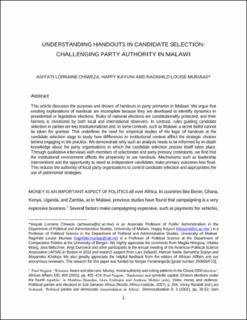| dc.contributor.author | Chiweza, Asiyati Lorraine | |
| dc.contributor.author | Kayuni, Happy M. | |
| dc.contributor.author | Muriaas, Ragnhild Louise | |
| dc.date.accessioned | 2022-04-05T08:38:00Z | |
| dc.date.available | 2022-04-05T08:38:00Z | |
| dc.date.created | 2021-12-02T09:09:58Z | |
| dc.date.issued | 2021 | |
| dc.identifier.issn | 0001-9909 | |
| dc.identifier.uri | https://hdl.handle.net/11250/2989829 | |
| dc.description.abstract | This article discusses the purposes and drivers of handouts in party primaries in Malawi. We argue that existing explanations of handouts are incomplete because they are developed to identify dynamics in presidential or legislative elections. Rules of national elections are constitutionally protected, and their fairness is monitored by both local and international observers. In contrast, rules guiding candidate selection in parties are less institutionalized, and, in some contexts, such as Malawi, a secret ballot cannot be taken for granted. This underlines the need for empirical studies of the logic of handouts at the candidate selection stage to study how differences in institutional context affect the strategic choices behind engaging in the practice. We demonstrate why such an analysis needs to be informed by an in-depth knowledge about the party organizations in which the candidate selection process itself takes place. Through qualitative interviews with members of selectorates and party primary contestants, we find that the institutional environment affects the propensity to use handouts. Mechanisms such as leadership interventions and the opportunity to stand as independent candidates make primary outcomes less final. This reduces the authority of local party organizations to control candidate selection and appropriates the use of patrimonial strategies. | en_US |
| dc.language.iso | eng | en_US |
| dc.publisher | Oxford University Press | en_US |
| dc.title | Understanding handouts in candidate selection: Challenging party authority in Malawi | en_US |
| dc.type | Journal article | en_US |
| dc.type | Peer reviewed | en_US |
| dc.description.version | acceptedVersion | en_US |
| dc.rights.holder | Copyright 2021 The Author(s) | en_US |
| cristin.ispublished | true | |
| cristin.fulltext | postprint | |
| cristin.qualitycode | 1 | |
| dc.identifier.doi | 10.1093/afraf/adab030 | |
| dc.identifier.cristin | 1963119 | |
| dc.source.journal | African Affairs | en_US |
| dc.source.pagenumber | 569-589 | en_US |
| dc.relation.project | Norges forskningsråd: 250669/F10 | en_US |
| dc.identifier.citation | African Affairs. 2021, 120 (481), 569-589. | en_US |
| dc.source.volume | 120 | en_US |
| dc.source.issue | 481 | en_US |
